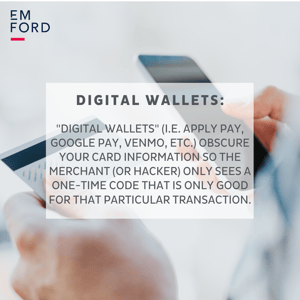The Black Friday and Cyber Monday sale notifications are bombarding our e-mail inboxes and phone notifications. It's go time. Before you shop online this holiday season-- is your identity secure? 43% of online shoppers in a survey stated that their identity theft happened during the holidays.
Cyber attacks are more present than ever in 2020 with everyone moving to doing most things virtually. Cyber attacks happen every 39 seconds-- online shopping, is no exception to this statistic. For this reason, we've rounded up a few hacks to avoid hackers for both online retailers and online consumers. (Check out the online retailers article here.)
USE SPECIFIC FORMS OF PAYMENT
A rule of thumb: it's always better to shop with a credit card online rather than shopping with a debit card. Credit card fraud is easier disputed because revolving credit is used, and with a debit card, that money is solely backed by your bank. What's even better than using a physical credit card? Enter the  world of "virtual wallets." This term may be new to you, but I assure you've used a form of this type of payment. Using Venmo, Apple Pay, Google Pay, etc. are a great way to protect yourself from fraud. Why? These "virtual wallets" obscure your credit or debit card information. The merchant (or hacker) only sees a one-time code/number on the transaction that is only good for that singular transaction. Long story short, it gives a card number or code that isn't your actual card. What a relief! Virtual wallets like Apple Pay also pre-load your shipping & billing information into your wallet, so you're shopping at the speed of light.
world of "virtual wallets." This term may be new to you, but I assure you've used a form of this type of payment. Using Venmo, Apple Pay, Google Pay, etc. are a great way to protect yourself from fraud. Why? These "virtual wallets" obscure your credit or debit card information. The merchant (or hacker) only sees a one-time code/number on the transaction that is only good for that singular transaction. Long story short, it gives a card number or code that isn't your actual card. What a relief! Virtual wallets like Apple Pay also pre-load your shipping & billing information into your wallet, so you're shopping at the speed of light.
STICK WITH SITES THAT ARE WELL-KNOWN, REPUTABLE OR USE HTTPS
Those Facebook and Instagram ads will speak to you every time, but if you've never heard of the brand or company, the golden rule of impulsive social media ad shopping is: only complete a purchase if their website begins with https (or has a lock next to the web address). HTTPS (HyperText Transfer Protocol Server) is an internet protocol for secure internet communication, meaning it is a completely secure website to enter in your information, and that information stays private when you complete a transaction. When shopping on mobile apps, only shop on official retailer apps.
SIGN UP FOR TEXT ALERTS ON ALL OF YOUR BANK/CREDIT CARD ACCOUNTS
Although this could be an annoying notification, turning this on during the holiday season to make you aware of any purchase that is made is one of the easiest ways to catch fraud, and catch it fast. Most credit card companies have settings where you can turn on text alerts for every single purchase, or.png?width=300&name=CYBER%20MONDAY_%20(1).png) text alerts for transactions that seem a little sketchy. These alerts give you the opportunity to catch fraudulent activity quickly and also disputing it quickly so your funds aren't tied up during the rush of holiday shopping. Have peace of mind knowing that the $859.76 purchase at Target was actually you (although I'm sure if it was Target, you had no doubts).
text alerts for transactions that seem a little sketchy. These alerts give you the opportunity to catch fraudulent activity quickly and also disputing it quickly so your funds aren't tied up during the rush of holiday shopping. Have peace of mind knowing that the $859.76 purchase at Target was actually you (although I'm sure if it was Target, you had no doubts).
BEEF UP YOUR PASSWORDS. MAKE THEM STRONG.
We are all guilty of using the same password for every user account we've ever created, or making them painfully obvious, just for the sake of remembering them all. We have to create usernames and passwords for EVERYTHING, so why wouldn't we go easy on ourselves? Weak passwords and passwords used repetitively are what make us vulnerable to cyber attacks. How will you remember all of these incredibly specific passwords including capitalization, numbers AND symbols? Password managers. Password managers are easy to download on your phone (remember, use official apps) and the contents are secure, protected, and usually require facial identification, a thumbprint, or some sort of pin number.
DON'T STORE CREDIT CARD INFORMATION ON YOUR ACCOUNTS
Well, two rules here: 1. Don't turn on the "autofill" function when you enter in your credit card information on a desktop or laptop web browser. 2. Don't save your credit card information to your online shopping accounts with retailers. I know the task of manually entering in your information seems daunting, but what's more daunting is when your identity is stolen. Another way to speed things up? Shop with retailers that use "virtual wallets" that we talked about at the beginning. Win-win!
There are plenty of opportunities for cyber attacks to happen, but the good news is, there are even more ways to protect yourself. Don't give your identity away to someone else as an accidental Christmas present this year, make sure your personal information stays protected and secure.

 world of "virtual wallets." This term may be new to you, but I assure you've used a form of this type of payment. Using Venmo, Apple Pay, Google Pay, etc. are a great way to protect yourself from fraud. Why? These "virtual wallets" obscure your credit or debit card information. The merchant (or hacker) only sees a one-time code/number on the transaction that is only good for that singular transaction. Long story short, it gives a card number or code that isn't your actual card. What a relief! Virtual wallets like Apple Pay also pre-load your shipping & billing information into your wallet, so you're shopping at the speed of light.
world of "virtual wallets." This term may be new to you, but I assure you've used a form of this type of payment. Using Venmo, Apple Pay, Google Pay, etc. are a great way to protect yourself from fraud. Why? These "virtual wallets" obscure your credit or debit card information. The merchant (or hacker) only sees a one-time code/number on the transaction that is only good for that singular transaction. Long story short, it gives a card number or code that isn't your actual card. What a relief! Virtual wallets like Apple Pay also pre-load your shipping & billing information into your wallet, so you're shopping at the speed of light..png?width=300&name=CYBER%20MONDAY_%20(1).png) text alerts for transactions that seem a little sketchy. These alerts give you the opportunity to catch fraudulent activity quickly and also disputing it quickly so your funds aren't tied up during the rush of holiday shopping. Have peace of mind knowing that the $859.76 purchase at Target was actually you (although I'm sure if it was Target, you had no doubts).
text alerts for transactions that seem a little sketchy. These alerts give you the opportunity to catch fraudulent activity quickly and also disputing it quickly so your funds aren't tied up during the rush of holiday shopping. Have peace of mind knowing that the $859.76 purchase at Target was actually you (although I'm sure if it was Target, you had no doubts).